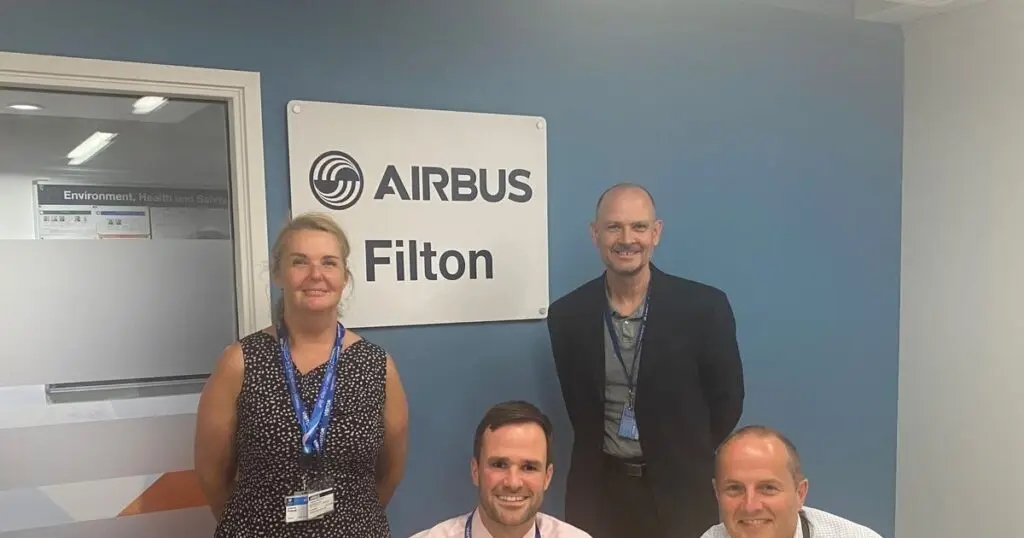Plans for a new technology and skills hub at Airbus’s site in Filton, South Gloucestershire, have taken a significant step forward. This development promises to enhance local aerospace and defence skills.
The aerospace giant has reached a heads of terms agreement with Weston College, outlining their collaboration for the new centre, which aims to offer courses and apprenticeships.
Establishment and Goals of the Centre
The proposed ‘Manufacturing, Technology and Skills Centre’ will serve as a focal point for education, training, and skills development. Leveraging the expertise of Weston College, Airbus, and other key regional employers, the centre aims to bolster the aerospace and defence skills across the region.
The aim of this initiative is to support and inspire a new generation of engineers, technicians, and innovators. The courses and apprenticeships offered will be designed in consultation with industry experts, ensuring they meet the current and future needs of the aerospace sector.
Significance of the Partnership
Alex Warner, deputy principal of Weston College, emphasised the transformative potential of this partnership. He stated, ‘This partnership with Airbus represents a transformative opportunity for our students and the wider community.’
This collaboration is expected to significantly enhance the skill set of the current workforce and generate new opportunities for aspiring engineers and technicians within the region. The centre will not only provide state-of-the-art facilities but also create a pipeline of skilled professionals to support the local industry.
Project Timeline and Development Plans
Work on the project is set to begin this month, with the first intake of students expected the following academic year.
The centre will feature state-of-the-art facilities tailored to the needs of the aerospace and high-value engineering sectors. The infrastructure will support a variety of educational and training programs, all aimed at meeting industry demands.
Once operational, the centre will play a vital role in bridging the skills gap in the aerospace sector. By offering relevant and up-to-date training, it is expected to address some of the current challenges faced by the industry in sourcing skilled labour.
Support from the Aerospace Industry
Simon Galpin, head of the Airbus Filton site, affirmed the company’s commitment to supporting the UK’s aerospace and manufacturing industry. He remarked on the importance of this partnership for regional training, stating, ‘What a privilege to be partnering with Weston College and the West of England Institute of Technology to further enhance regional training for the Aerospace and High Value Engineering sectors in North Bristol.’
This initiative aligns with Airbus’s broader strategy of fostering local talent and supporting the growth of the UK’s aerospace sector. By collaborating with educational institutions and other industry stakeholders, Airbus aims to ensure a steady supply of highly skilled professionals.
Community and Economic Impact
The new centre is anticipated to have a significant positive impact on the local community. Not only will it create educational and employment opportunities, but it will also contribute to the local economy by attracting investment and fostering innovation.
The collaboration between Airbus, Weston College, and other regional employers underscores a commitment to the community’s long-term economic and social development. This venture is poised to become a cornerstone of the local aerospace industry.
The centre represents a forward-thinking approach to addressing both current and future skills needs in the aerospace sector. By providing tailored training and development programmes, it will help secure the region’s position as a hub for aerospace and high-value engineering expertise.
Future Prospects and Aspirations
This initiative is not just about immediate benefits; it also looks toward future opportunities for growth and development within the aerospace sector. By establishing a dedicated training and skills centre, Airbus and Weston College are setting the stage for long-term advancements in technology and workforce capabilities.
The project is expected to inspire similar initiatives across the UK, showcasing a successful model of industry-education collaboration. The potential ripple effects of this centre could lead to broader enhancements in aerospace training nationwide.
Conclusion
The partnership between Weston College and Airbus marks a significant step forward in regional aerospace training and skills development. With work commencing soon, the centre is set to become a pivotal institution for the local industry.
By addressing the current skills gap and preparing for future demands, the new centre is poised to make a lasting impact on the aerospace sector in South Gloucestershire and beyond.
The partnership between Weston College and Airbus marks a significant step forward in regional aerospace training and skills development. With work commencing soon, the centre is set to become a pivotal institution for the local industry.
By addressing the current skills gap and preparing for future demands, the new centre is poised to make a lasting impact on the aerospace sector in South Gloucestershire and beyond.


